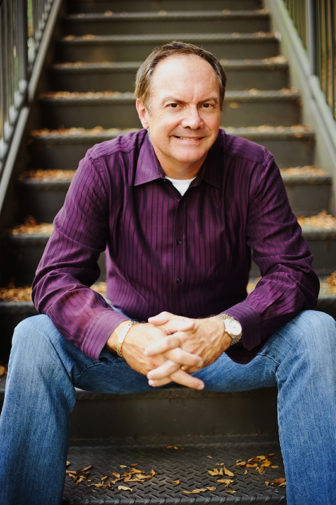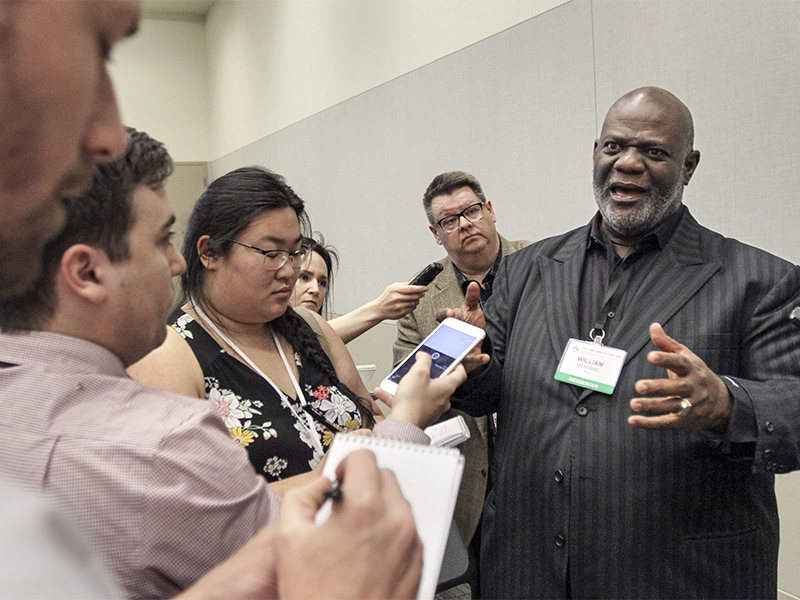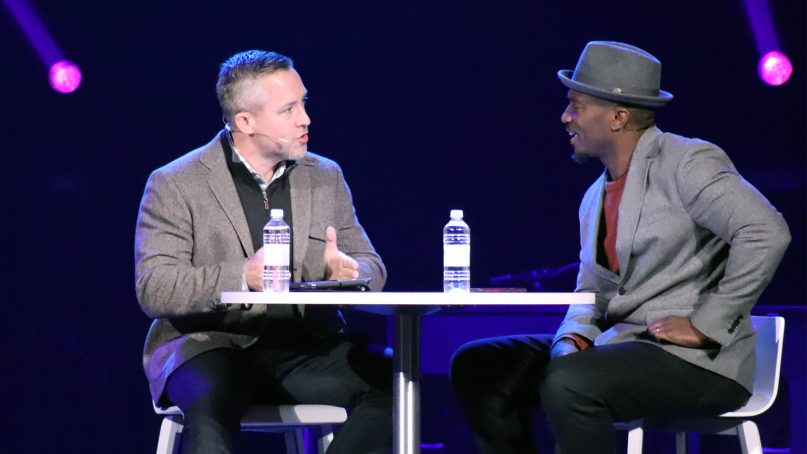(RNS) — In recent decades the Southern Baptist Convention, which was founded defending slavery, has attempted to come to terms with its record on race.
Now as the nation’s largest Protestant denomination faces a rare leadership vacuum at the top of two of its agencies and two of its seminaries — and installs a new mission board president Wednesday (Feb. 6) — questions have arisen about whether its statements committing to diversity will be reflected in hiring decisions.
SBC President J.D. Greear told Religion News Service he has recommended that search committees seeking new executives keep racial diversity in mind and consider going beyond “following networks that you know” in their search.
“In the ones that have asked me I have strongly encouraged there to be at least consideration given,” he said in an interview in January.
Greear noted that he does not have direct control over the selection of the new leaders. But he said that the search committees are open to diverse candidates.
“I haven’t received resistance from any of the search committees that I’ve talked to,” he said.

James Merritt is a former president of the Southern Baptist Convention. Photo courtesy of James Merritt
Last week, two former SBC presidents, joined by a prominent Las Vegas pastor, took the unusual step of sending a letter to the search committee for the new president of the SBC Executive Committee, inquiring about the breadth of efforts to replace Frank Page. Page retired last year after a “morally inappropriate relationship.”
“In your search for the person to fill this position, have you interviewed any minority candidates?” asked James Merritt, Bryant Wright and Vance Pitman in an email to the search committee, according to the Biblical Recorder, a Baptist journal in North Carolina. “If not, we respectfully ask why not?”
Merritt confirmed to RNS that he sent the email. In response, he said, the committee “respectfully declined to answer our questions,” saying it could not reveal internal discussions.
“We felt like it was a legitimate question to ask out of a deep concern that we do indeed fulfill both the spirit and the letter of what we resolved to do,” said Merritt, a Georgia pastor. “And that is to reach far and wide and include minorities in the process.”
Almost a quarter century ago, Southern Baptists passed a historic resolution repudiating slavery. In 2012, they elected New Orleans pastor Fred Luter as the SBC’s first black president to a one-year term and re-elected him the next year. In 2015, they passed another statement that urged “Southern Baptist entities and Convention committees to make leadership appointments that reflect the racial and ethnic diversity of the body of Christ and of the Southern Baptist Convention.”
Texas pastor Dwight McKissic, who has called for the SBC to place minorities in appointed executive positions — beyond the elections of denominational officers to one-year terms — tweeted his appreciation of the email sent by the three Baptist leaders.
“It would be a travesty to appt a Prez, without … interviewing a minority,” he tweeted Saturday. “It would be a huge statement of disrespect to the 20% + minority churches who comprise the SBC.”
Roger “Sing” Oldham, spokesman for the Executive Committee, responding to a request for additional information, said the search committee is “diverse in its composition” — including a white woman and two black male pastors. He expects it will update the full committee about its search by its Feb. 18 meeting.
Oldham noted that the nominees elected to the SBC’s boards and committees in June, and chosen by its Committee on Nominations, were 12.6 percent non-Anglo. Of those nominees who were not serving as pastors, 43 percent were women.
RELATED: Southern Baptists’ efforts at racial reconciliation a mixed bag, review finds
Recently, at least two milestones also have been reached among the six SBC seminaries. Southern Baptist Theological Seminary, the Kentucky-based flagship of those seminaries, appointed its first African-American board officer in 2018. Also last year, a woman was elected chair of the trustee board of Southeastern Baptist Theological Seminary in North Carolina.
Merritt said he hoped that all the current search committees would consider and interview diverse candidates.
“I think too often that Southern Baptists, we kind of come to the party a little bit late and too often we’ve been the caboose and not the locomotive,” he said. “And I think that we have an opportunity here to kind of start changing that narrative.”
After Wednesday’s installation of Paul Chitwood as president of the International Mission Board, four major SBC institutions will need to find new leaders: the Executive Committee, two seminaries and LifeWay Christian Resources, the SBC’s publishing division.
Paige Patterson was ousted as president of Southwestern Baptist Theological Seminary in Texas in May after allegedly dismissing women’s concerns about rape and domestic abuse. New Orleans Baptist Theological Seminary President Chuck Kelley announced in October that he would retire at the end of this academic year. Thom Rainer announced in August that he plans to retire from LifeWay this year.

The Rev. Dwight McKissic, pastor of Cornerstone Baptist Church in Arlington, Texas, speaks with reporters at the Southern Baptist Convention annual meeting on June 14, 2017, in Phoenix. Photo by Van Payne/Baptist Press
McKissic said in an interview that he has seen progress in blacks being hired as Baptist association and state convention staff. He said he also is aware of minority candidates who have applied for past open executive positions and were not chosen.
“It’s not because they are not interested or they don’t apply,” said the black pastor, who has proposed SBC statements condemning the Confederate flag and “alt-white supremacy.”
“The Southern Baptist Convention has not demonstrated a willingness to place a black — a minority, period — to those high-level positions,” he said.
Dhati Lewis, the sole African-American vice president at the convention’s North American Mission Board, said he is not optimistic about diversity being accomplished soon in the top ranks, though he believes it should occur.
“They’re going to choose people that they trust,” he said of selection committees. “And when your relationships aren’t diverse, it’s hard to find people that you can trust that don’t look like you, talk like you and act like you.”
Appointing more diverse executive leadership beyond the traditional choices, he said, would be an opportunity for the convention “to show that we genuinely want to reach North America and we can get beyond our Southern roots and we can become more global.”
Asked about whether a woman could assume any of these positions, some leaders said that there’s nothing in the denomination’s constitution that precludes a female executive. The SBC’s faith statement declares that “the office of pastor is limited to men as qualified by Scripture.”
Greear said his North Carolina megachurch has reviewed its staff directory and determined that many roles that traditionally had been held by men could be held by women. Now, the captain of its domestic and overseas missions program is a woman.
“I think the SBC as a whole – that’s in front of us – is asking the same questions,” Greear said.





